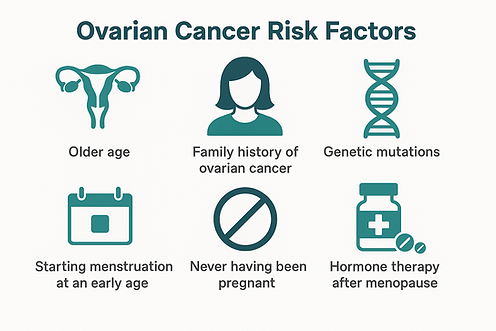_edited.png)
About Ovarian Cancer
What You Need To Know
Ovarian cancer begins in the ovaries or surrounding areas such as the fallopian tubes. It is often called the 'silent killer' because symptoms are subtle and easily mistaken for other conditions. Learning to recognize the early warning signs can make all the difference. Please know that a Pap test DOES NOT detect ovarian cancer.
Common Early Symptoms
• Persistent bloating or abdominal swelling
• Pelvic or abdominal pain
• Feeling full quickly or loss of appetite
• Frequent or urgent need to urinate
• Unexplained fatigue or back pain
• Changes in bowel habits (constipation, upset stomach)
• Pain during intercourse
• Unexplained weight loss or irregular bleeding
• Heartburn
Risk Factors
• Family history of ovarian or breast cancer
• BRCA1 or BRCA2 gene mutations
• Older age
• Never having been pregnant or infertility
• Endometriosis
• Hormone replacement therapy or obesity


When to see a Doctor
If you experience new and persistent symptoms that last more than a few weeks, consult your doctor. There is currently no reliable routine screening test for ovarian cancer, so awareness and self-advocacy are vital.
Prevention and Awareness
• Know your family history
• Consider genetic counseling if at risk
• Maintain regular gynecological checkups
• Stay informed about ongoing research and early detection programs
Every woman should know the signs of ovarian cancer. By sharing this information, we can help save lives.



